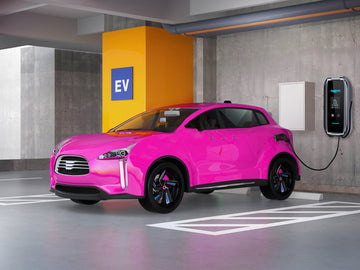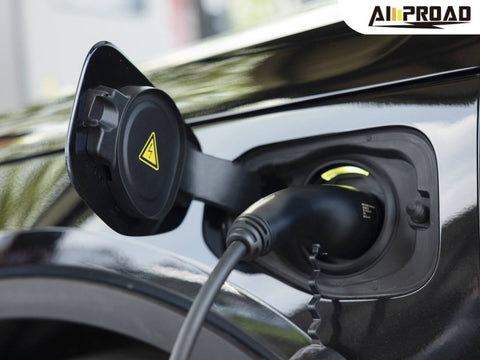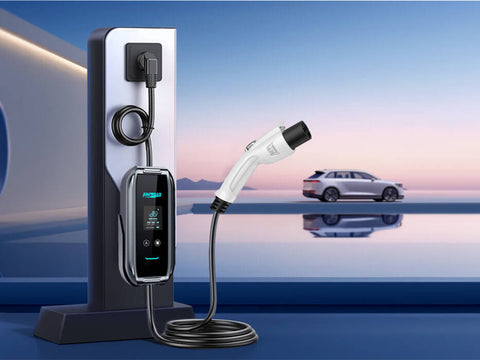
With electric vehicle adoption on the rise, businesses are adapting by installing commercial EV charging stations. As demand grows, understanding the costs involved is essential for those looking to stay ahead in the evolving automotive landscape.
Average Cost Overview of the Commercial EV Charging Stations
As businesses and property managers dive into the realm of Commercial EV Charging Stations, a comprehensive understanding of the average costs involved is crucial. From the equipment itself to the intricacies of installation, various factors contribute to shaping the financial landscape of embracing electric vehicle (EV) charging. Let's delve into the key aspects of average costs, considering both equipment and installation variables.
Equipment and Installation Costs
At the heart of any Commercial EV Charging Station investment is the equipment cost, which encompasses the charging station itself and the expenses associated with its installation.
Equipment Cost
The average cost for a commercial-grade, Level 2 EV charging station typically hovers around $6,000. This figure, however, serves as a general benchmark, as the market offers a spectrum of charging station options with varying features and capabilities. Basic setups can be procured for around $2,500, while more sophisticated, high-end installations may command costs in the range of $10,000 to $13,000.
The price fluctuations stem from factors such as charging speed, brand reputation, durability, and additional features like network connectivity and user interfaces. Businesses can tailor their choices based on the specific needs of their location and target audience.
Installation Variables
The installation of a Commercial electric vehicle Charging Station introduces a set of variables that further contribute to the overall cost structure. These variables include labor costs and the time required for installation.

Installation Variables
Labor Costs
Labor costs for the installation of Commercial EV Charging Stations vary based on geographical location and electrician rates. On average, businesses can expect labor costs ranging from $70 to $100 or more per hour. The actual hourly rates depend on local market conditions, the complexity of the installation, and the expertise of the electrician.
Choosing a qualified and experienced electrician is paramount to ensuring a seamless and compliant installation. Electricians familiar with electric vehicle charging station setups bring valuable insights and can navigate potential challenges efficiently.
Time:
The time required for installation is a dynamic variable influenced by the specifics of the property. Factors such as the distance from the main power source, the need for electrical upgrades, and any construction involved in preparing parking spaces contribute to the overall installation timeline.
To obtain a precise estimate, businesses should seek pre-installation bids. This involves engaging with electricians or charging station installation professionals to assess the property, identify potential challenges, and provide a detailed timeline for the installation process.
Considerations for Businesses:
For businesses and property managers venturing into the realm of ev car charging station, several considerations can guide their decision-making process:
Budget Allocation: Having a clear budget allocation for both equipment and installation is fundamental. Understanding the range of costs associated with different charging station setups allows businesses to align their investments with their financial goals.
Local Regulations: Familiarizing oneself with local regulations and permitting processes is crucial. Compliance with local codes ensures the legality and safety of the charging station installation.
Future-Proofing: Considering future growth and potential increases in EV adoption is strategic. Opting for scalable solutions that can accommodate additional charging stations in the future allows businesses to adapt to evolving demand.
User Experience: Enhancing the user experience is a key objective. Businesses should explore features such as network connectivity, user authentication, and software integration to provide a seamless and user-friendly charging experience.
Environmental Impact: Embracing EV charging aligns with sustainability goals. Choosing energy-efficient charging stations and exploring renewable energy sources for power contribute to an environmentally conscious charging infrastructure.
As businesses and property managers navigate the landscape of Commercial evse charging station, a holistic understanding of costs is paramount. From the initial investment in equipment to the intricacies of installation, each component plays a crucial role in shaping the accessibility and viability of EV charging at commercial locations. By carefully considering equipment choices, labor costs, installation timelines, and future growth prospects, businesses can position themselves as leaders in the evolving paradigm of electric mobility, meeting the needs of both their clientele and the environment.

Tailoring Charging Solutions to Your Needs
In the dynamic landscape of Electric Vehicle (EV) charging, selecting the right charging level is akin to choosing the perfect tool for the job. Each level caters to specific needs, considerations, and budgets, ensuring a diverse array of options for users. Let's explore the characteristics of each charging level to guide you in selecting the one that aligns seamlessly with your unique requirements.
Level 1 Charging Stations
Affordable, but Patience Required:
Level 1 charging stations emerge as the budget-friendly option, presenting an accessible entry point for EV enthusiasts. With costs typically under $3,000, these stations appeal to those who prioritize economic considerations.
Slow and Steady:
However, Level 1 charger operates at a slower pace. To charge a vehicle for a 250-mile range, it might take up to 43 hours. This charging level finds its niche in the calm and steady rhythm of single-family homes, where extended charging times are less of a concern.
Facing the Future:
Despite its affordability, there's a caveat to Level 1 charging: the specter of potential future obsolescence. As EV technology continues to advance, the slow-charging nature of Level 1 charging stations may become less aligned with the expectations of an evolving market.
Level 2 Charging Stations
Balancing Cost and Efficiency:
Level 2 charging stations strike a harmonious balance between cost and efficiency. With an average cost of $6,000, they represent a middle ground, appealing to users seeking both economical and swift charging solutions.
Efficient and Versatile:
Efficiency is the hallmark of Level 2 charging. In approximately 4 to 8 hours, these stations can charge a vehicle, making them an attractive option for a variety of settings. Their versatility extends to residential areas, commercial spaces, and multifamily settings, accommodating a diverse range of users.
A Popular Choice:
The efficiency and adaptability of Level 2 charging have propelled it into the spotlight as a popular choice for a wide array of applications. Its presence in residential neighborhoods, workplaces, and communal spaces makes it a familiar and dependable option for EV users. In this landscape, considering a quality Level 2 EV charger supplier like Amproad enhances the appeal of this charging level. Amproad, known for its commitment to providing efficient and reliable charging solutions, aligns seamlessly with the adaptability and versatility that Level 2 charging stations offer. With Amproad's expertise, businesses and property managers can further optimize the performance and reliability of their charging infrastructure, ensuring a positive and efficient charging experience for electric vehicle users in various settings.Level 3 Charging Stations
Investment for Speed with the Level 2 Charging Stations
Level 3 charging stations step into the arena as a more significant investment, demanding a fully installed cost of around $50,000. This cost reflects the emphasis on rapid charging and the unique features offered by these stations.
Rapid Charging with DC Magic:
The defining feature of Level 3 charging is DC Fast Charging, a technological marvel that propels charging speeds to new heights. In under an hour, users can experience a substantial boost in their EV's range, catering to those who require swift charging capabilities.

Strategic Locations for High Impact:
Level 3 charging stations strategically position themselves at car dealerships, commercial charging stations, and rest stops—locations where users are on the move and need quick, efficient charging. These stations play a crucial role in facilitating long-distance travel and enhancing the accessibility of EVs.
Choosing the Right Level for Your Journey:
Residential Deliberations: In the peaceful corners of single-family homes, Level 1 or Level 2 charging may find its place as the home EV charger. The choice depends on the homeowner's budget, patience, and the urgency of their charging needs.
Versatile Solutions: For businesses, workplaces, and multifamily residences, the versatile and cost-effective nature of Level 2 charging makes it a go-to solution. It strikes a balance between efficiency and accessibility, meeting the needs of diverse user groups.
On-the-Go Rapid Charging: For those in perpetual motion, Level 3 charging stations become a beacon of convenience. Positioned at high-impact locations, these stations cater to users who demand rapid charging capabilities as they embark on their journeys.
As the charging stations near me landscape expands, when car won't start, users find themselves at the crossroads of choice, where each level of charging offers a unique journey. Whether it's the affordability of Level 1, the balance of cost and efficiency with Level 2, or the rapid charging prowess of Level 3, the spectrum caters to a spectrum of needs. So, as you embark on your EV journey, let the characteristics of each charging level guide you toward the perfect fit for your unique requirements, ensuring a seamless and satisfying experience on the road to electric mobility.
Additional Costs of Nurturing the Charging Infrastructure
Beyond the initial investment, maintaining your charging stations is a crucial aspect to ensure their longevity and reliability. Here's a glimpse into the annual maintenance costs for different charging levels:
Maintenance for Level 1 and level 2 charger Stations typically incurs an annual cost of around $300. This modest investment contributes to the upkeep of the stations, ensuring they function optimally and provide a reliable charging experience for users.
Level 3 charging stations, with their advanced technology and rapid-charging capabilities, require more extensive care. Annual maintenance costs for these stations can range from $2,000 to $3,000. This investment is essential to sustain the high-performance standards demanded by these rapid-charging solutions, providing users with a swift and dependable charging experience. Regular maintenance not only safeguards the stations but also contributes to a seamless and efficient charging ecosystem, ensuring your charging infrastructure remains a valuable asset for the long haul.
Total Cost of Ownership of the EV Charging Stations
When assessing the total cost of ownership for your charging infrastructure, it's crucial to factor in ongoing maintenance expenses. This element significantly influences the overall financial landscape, impacting your budget and the reliability of your charging stations.
The total cost of ownership extends beyond the initial investment, encompassing the regular upkeep required for sustained performance. Ongoing maintenance ensures that your charging stations remain in optimal condition, providing users with a seamless and dependable charging experience.
Level 3 charging stations, renowned for their rapid-charging capabilities, incur higher maintenance costs compared to their Level 1 and Level 2 counterparts. This is a consideration for businesses and property managers as they weigh the benefits of rapid charging against the associated maintenance expenditures.
As you navigate the landscape of total cost of ownership, balancing the efficiency of rapid charging with the maintenance costs allows you to make informed decisions about the sustainability and long-term viability of your charging infrastructure.


